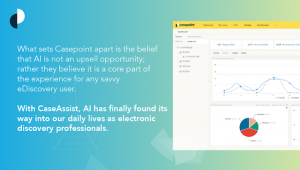AI Pioneers Have A Big Advantage In eDiscovery
Powerful & accessible AI for all eDiscovery professionals.
 Smart speakers were the “it” gift this past holiday season. From November to the end of the year, Google sold a Google Home almost every second and Amazon Echos surely out performed avocados sales at Whole Foods. These unassuming speakers are cheap, easy-to-use, and leverage Artificial Intelligence (AI) like crazy. Thanks to AI you can ask these gadgets to play music, tell you a joke, or even place a pizza order just by speaking naturally into the air. AI has finally found its way into our daily lives.
Smart speakers were the “it” gift this past holiday season. From November to the end of the year, Google sold a Google Home almost every second and Amazon Echos surely out performed avocados sales at Whole Foods. These unassuming speakers are cheap, easy-to-use, and leverage Artificial Intelligence (AI) like crazy. Thanks to AI you can ask these gadgets to play music, tell you a joke, or even place a pizza order just by speaking naturally into the air. AI has finally found its way into our daily lives.
AI-speakers were around last year, but they found their tipping point this year thanks to constant evolution and development. Amazon and Google have easily dominated the AI-powered speaker space with their technological advances by being a year or two ahead of their competition.
Here’s the legal tie-in: eDiscovery platforms are now starting to use AI to substantially improve the discovery process. Discovery-related AIs are not about voice assistants, but they are about finding important documents, facts, and issues with little effort and at highly-accelerated speed. Companies that started on discovery AI a couple years ago are way ahead of the pack, just like Google and Amazon are ahead in smart speakers. In AI technology, it pays to be first to market.
Pioneering companies like Casepoint have long embraced the the idea of applying AI to improve the process of electronic discovery. In early 2017, after more than 18 months of focused development, Casepoint launched its biggest AI feature called, “CaseAssist.” Casepoint’s eDiscovery platform suddenly had its CaseAssist AI engine infused into its core technology suite. Overnight lawyers and legal teams were able to identify key documents quickly and benefit from an automated recommendation engine, without the need for certifications in advanced analytics. Advanced tools and important results were finally accessible to everyday users.
With a talented troop of software experts, Casepoint’s AI features continue respond to real customers’ needs. In any given month, an average of 30 features are added to the Casepoint platform, including advancements to the CaseAssist AI. Today Casepoint is on its 2.0 version of CaseAssist, while others are just beginning to show interest in AI.
Just like Amazon and Google did with voice assistants, Casepoint’s CaseAssist pioneers user-friendly and functional artificial intelligence for the benefit of legal teams during discovery. It is amazing what a couple-years head start can do.
For the newly released sneak peek video into CaseAssist, press release, infographics, and more follow Casepoint’s page dedicated to Artificial Intelligence (AI.Casepoint.com).








